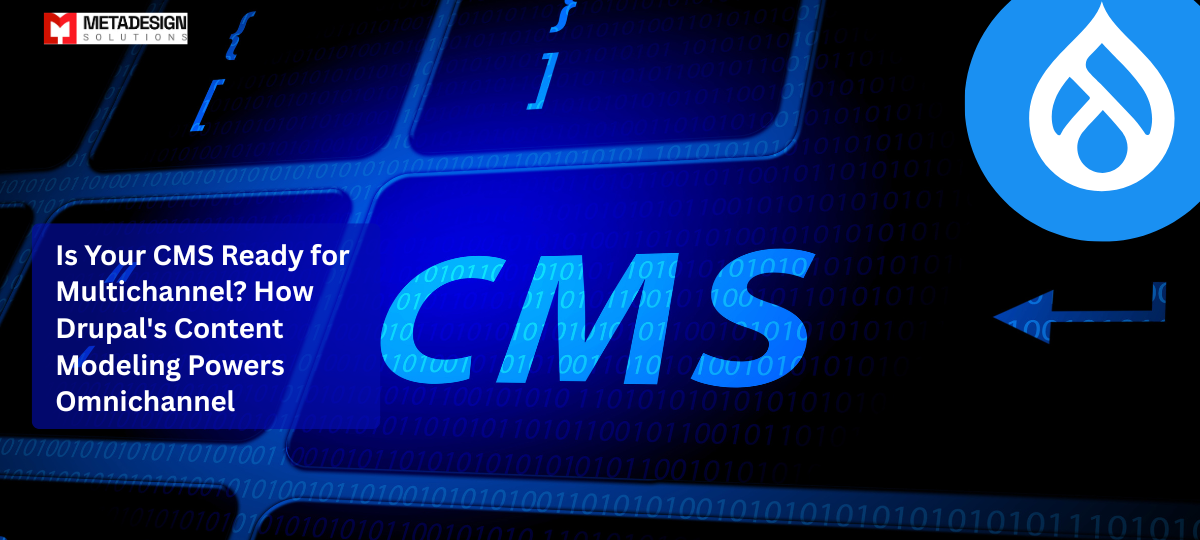In today’s fast-paced digital world, omnichannel marketing has become a critical strategy for businesses to engage customers across multiple touchpoints. However, as marketers and businesses grow, delivering content consistently and efficiently across all channels—such as websites, apps, IoT devices, and more—can become a daunting task.
For marketing managers, the struggle is real: How can you manage content that needs to be delivered to different platforms, each with its own specifications and requirements, from a single source of truth? The answer lies in Drupal’s content modeling capabilities and decoupled content strategy.
In this post, we’ll explore how Drupal’s flexible content modeling powers a seamless omnichannel experience, making it easier for marketing teams to deliver consistent, high-quality content across all platforms.
1. What is Content Modeling, and Why Does It Matter for Omnichannel?
Content modeling is the process of organizing, structuring, and categorizing your content in a way that it can be reused and delivered across multiple platforms efficiently. With a well-thought-out content model, marketing teams can create content once and push it to a variety of destinations—whether it’s your website, mobile apps, IoT devices, voice assistants, or any other channel.
For marketing managers, this means reduced time and effort in creating and adapting content for each specific platform, and a consistent user experience across every touchpoint.
2. How Drupal’s Content Modeling Powers Omnichannel Delivery
Drupal’s content modeling allows businesses to define content types (such as articles, blog posts, products, etc.) and structure them in a way that aligns with the business’s specific needs. Drupal development services uses content entities and fieldable content types, enabling the content to be flexible and scalable for diverse channels.
Key features that make Drupal ideal for omnichannel content delivery include:
- Structured Data: Drupal stores content in a structured way, allowing it to be easily adapted for different formats. Whether you need to output content to a website, an app, or an IoT device, Drupal ensures that all content is stored consistently and is readily available for any platform.
- Headless or Decoupled CMS: With Drupal’s decoupled architecture, you can manage your content centrally and distribute it across multiple front-end interfaces, from websites to mobile applications to IoT devices, without having to rely on platform-specific CMSs. This decoupling ensures that you can deliver content to any device or application via APIs. Read more about headless drupal CMS here.
Flexible Content Architecture: With Drupal, you can create custom content models that include reusable fields such as text, images, videos, metadata, and more. This makes it easy to reuse content and make it adaptable to the needs of different platforms, ultimately boosting your content’s lifecycle management.
Unlock True Omnichannel Power with Drupal Development Services
Future-Proof Your Content Strategy: Don’t let your CMS limit your reach. Embrace Drupal’s content modeling to power seamless, personalized experiences across every channel your customers use.
3. Reducing Operational Costs and Increasing Efficiency with Drupal’s Multichannel Capabilities
Managing content across multiple channels can be time-consuming and costly—especially if you’re relying on different CMS solutions for each platform. With Drupal, the content once, deploy everywhere approach minimizes operational overhead by streamlining the content creation and distribution process.
Here’s how Drupal helps:
- Centralized Content Hub: By centralizing all your content in Drupal, you eliminate the need for managing content in multiple systems, reducing the risk of inconsistencies and duplicated efforts.
- APIs and Integrations: Drupal’s robust API capabilities allow easy integration with other platforms, tools, and services. Whether it’s integrating with an external CRM, marketing automation tool, or e-commerce platform, Drupal’s APIs ensure that content can be pushed to any destination seamlessly.
- Streamlined Updates and Maintenance: Instead of updating content across multiple systems, Drupal enables you to update content in one place, ensuring that changes are reflected across all channels in real time.
4. The Role of Drupal Development Services in Omnichannel Strategy
To fully leverage Drupal’s content modeling and omnichannel capabilities, many businesses turn to Drupal development services. Professional Drupal developers can help design and implement the ideal content architecture that suits your business’s needs, ensuring that your content is structured in the most efficient way possible for omnichannel delivery.
Whether you’re looking for a fully decoupled solution, a hybrid CMS setup, or just a more robust content management strategy, Drupal developers can tailor the platform to ensure optimal performance across all channels.
5. The Future of Multichannel Marketing with Drupal
As the number of platforms and devices continues to grow, the need for a flexible CMS solution like Drupal will only increase. The rise of voice search, smart devices, and augmented reality further amplifies the demand for multichannel content strategies.
By leveraging Drupal’s content modeling and decoupled architecture, businesses can stay ahead of the curve in delivering seamless, consistent, and engaging content across all touchpoints. For marketing managers, this means greater agility, better control over content distribution, and more time to focus on strategy rather than content management.
Ready to Unlock the Power of Multichannel Content?
If you’re ready to harness Drupal’s content modeling and take your omnichannel strategy to the next level, Talk to Our Drupal Experts today! Our Drupal specialists are here to guide you through the process of building a flexible, scalable content architecture that will save you time, reduce costs, and increase your customer engagement across all channels.
Relevant Hashtags:
#Drupal #ContentModeling #Omnichannel #CMS #DecoupledCMS #MarketingStrategy #DrupalDevelopment #ContentManagement #DigitalTransformation #HeadlessCMS #IoTContent #MultichannelMarketing #ContentStrategy


